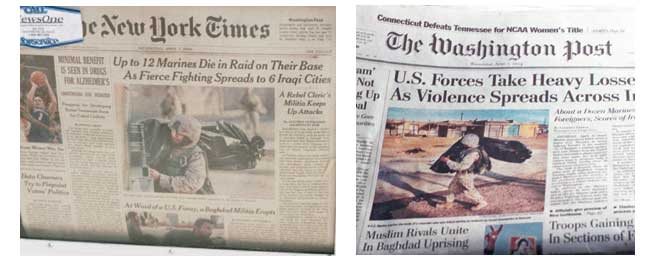Last year there was a controversy at Indiana University School of Law — Bloomington, my alma mater, over affirmative action. Basically, one professor raised a stink saying the Law School was admitting totally unqualified students, and everybody closed ranks against him. He may have been overblown in his claims, but I will remain neutral on any such factual details. I ended up having an email exchange with a friend who is associated with the Law School. The immediate impetus for our conversation was this article by the law school Dean, which talked about desegregation in the military. The Dean’s article more or less argued that there was a need for minorities to see people of their own group in positions of authority for the sake of legitimacy and public order. I thought the article was off point, and had the following response.
I have any number of objections to affirmative action. I am enough of an old-fashioned small “l” liberal to actually believe in an ideal of a democratic society composed of citizens who are judged on their merits and conduct as individuals without regard to race or any other non-relevant criterion. I am not talking about the old canard that everyone has the same right to beg for bread or sleep under bridges. If some person or group of persons is at a disadvantage, it is both practical and decent to assist them. So, if there is a neighborhood where most of the kids have fathers who take no responsibility for them, the community can (1) condemn the bad behavior, and (2) intervene to assist the children who are so afflicted. This type of thing could be applied without regard to skin color as a criterion. The fact that a disproportion of people so assisted might be black would not change the basic approach. That is how I’d like to play it. But that little squib on Lex’s views is all by way of background.
What we have currently is a system of interest-group politics with a moral fig leaf. Its ongoing viability requires that resentment and guilt be preserved rather than superseded, and it requires all participants to believe that blacks and other groups which may lobby successfully for “victim” status are perpetually going to need to be judged by different standards than the supposedly privileged majority. In Chicago we have the farcical situation of a gay alderman insisting on business set-asides for gay-owned businesses, where the gays in Chicago are already near the top of the economic ladder, just because they are supposedly an oppressed minority. The unspoken presumption is that the majority can be cowed into silence forever with accusations of racism and imputations of guilt, and because sophisticated opinion is uniform on the subject. The problem is that when a majority is told its genuine concerns about fairness are illegitimate you create a vacuum which can be filled by someone like George Wallace, or Jean-Marie Le Pen in France or Georg Haider in Austria. Sweeping majority grievances under the rug forever is not long-term viable.
In a democratic society, these forced diversity-seeking approaches present a serious problem of legitimacy. For example, the article talks about how IU looks at other things beside LSATs and grades. OK. Does everybody get looked at that way? If the LSATs and grades are not good predictors of success in law school, or otherwise valid criteria for admission, why are they used at all? In other words, what is the playing field, and who gets to play on it? Americans have made a bargain with themselves that most foreigners cannot understand. We tolerate lots of inequality because we also insist on lots of opportunity, widely and fairly diffused, and a system which rewards the winners of competitive struggles, and which allows failure. This system does not work ideally as advertised, but it works pretty well much of the time. This is the capitalisme sauvage the French cannot stand. It leads to a very productive, dynamic economy and great, if un-egalitarian, wealth — and contra F. Scott Fitzgerald countless opportunities for many, many second acts and third acts in people’s lives. Communal efforts to opt out of this basic system, but still seize its benefits, lead to widespread and angry resentment, usually of the sullen and quiet variety. And sullen, angry resentment has a way of exploding out of the blue and causing all kinds of problems. Every time an affirmative action hire is made, there is a retail benefit conferred on that person, and wholesale resentment on the part of the numerous persons rejected, in their view unfairly. This is a prescription for further balkanization of a country whose social peace rests on a strong, widely-shared vision of equal opportunity and competitive fairness on an individual basis.
The specific issue of the military does not cut a whole lot of ice with me. There was an excellent article in Business Week which explained that the business community hated the idea of any change in affirmative action. They have invested heavily in the current arrangement, and businesses hate uncertainty and change more than anything. They have diversity coordinators, and diversity policies, and they have their ducks in a row to oppose any discrimination suits, and they don’t want any changes made, which is rational. The military is similar. It is a large bureaucracy, with enough on its plate right now without having to reinvent the wheel on something they have been doing for a while now which is accepted, however grudgingly by some. They are way down a certain road and don’t want to change.
Now, the Vietnam example points up a moral problem underlying this. The idea seems to be that there must be black officers so that black troops will believe the army’s authority is legitimate, otherwise they will “frag,” i.e., murder, their officers if conditions get bad. Well, is this the model we apply to society at large? Minorities must see people of their own race/religion/sexual orientation in positions of authority or they will do … what exactly? Have a riot? So, minorities can use an implicit threat of violence, or some other extra-legal and extra-democratic threat, as a way to obtain what they want? The problem is, what if majorities start playing that game? For one thing, they’d win.
I don’t think the high proportion of minority personnel in the military is there because there was affirmative action to get more black officers. The poorest people in any society disproportionately go into the military — urban slums and rural backwaters are always good recruiting grounds, all the way back to the Roman legions. In the late 19th and early 20th C. the US Army had a huge disproportion of off-the-boat Irish Catholics. The officer corps was southern and midwestern Protestants, and the senior ranks were mostly Freemasons. There was utter social exclusion, every bit as severe as any race-based exclusion. The officers led, the men followed, and the Indians and the Spanish and Aguinaldo’s guerillas in the Phillipines were all beaten by that army. The Army is highly Hispanic these days, as well as black, for the same reason. And the “fragging” in Vietnam had more to do with the failure to properly train and lead the troops, and the increasingly obvious fact that the leadership (civilian and military) did not have any idea how to win the war and that dying in it was pointless. That pathological state of affairs had a lot to do with what happened over there, and even with more black officers the same basic dynamic would have been in place. Anyway, there are countless examples of successful armies led by a minority of officers whose troops are of some other group, racial, social, religious, what have you. In fact, that is the historical norm.
Even if the Army were better off for having made an effort to create more black officers, I don’t think there is a strong analogy between leading people into mortal danger and getting a job at Ice, Miller.
So, there should be criteria for admission, they should be as objective as possible, and everybody applying should have to satisfy them. What would happen is that the same minority student who now gets into an elite school where he lacks objective qualification, and then ends up in a self-imposed ghetto of similar students, would be a true competitor at a school one tier down. We’d all be better off.
I responded to a subsequent email with a further e-avalanche, which I will post in a few days.

